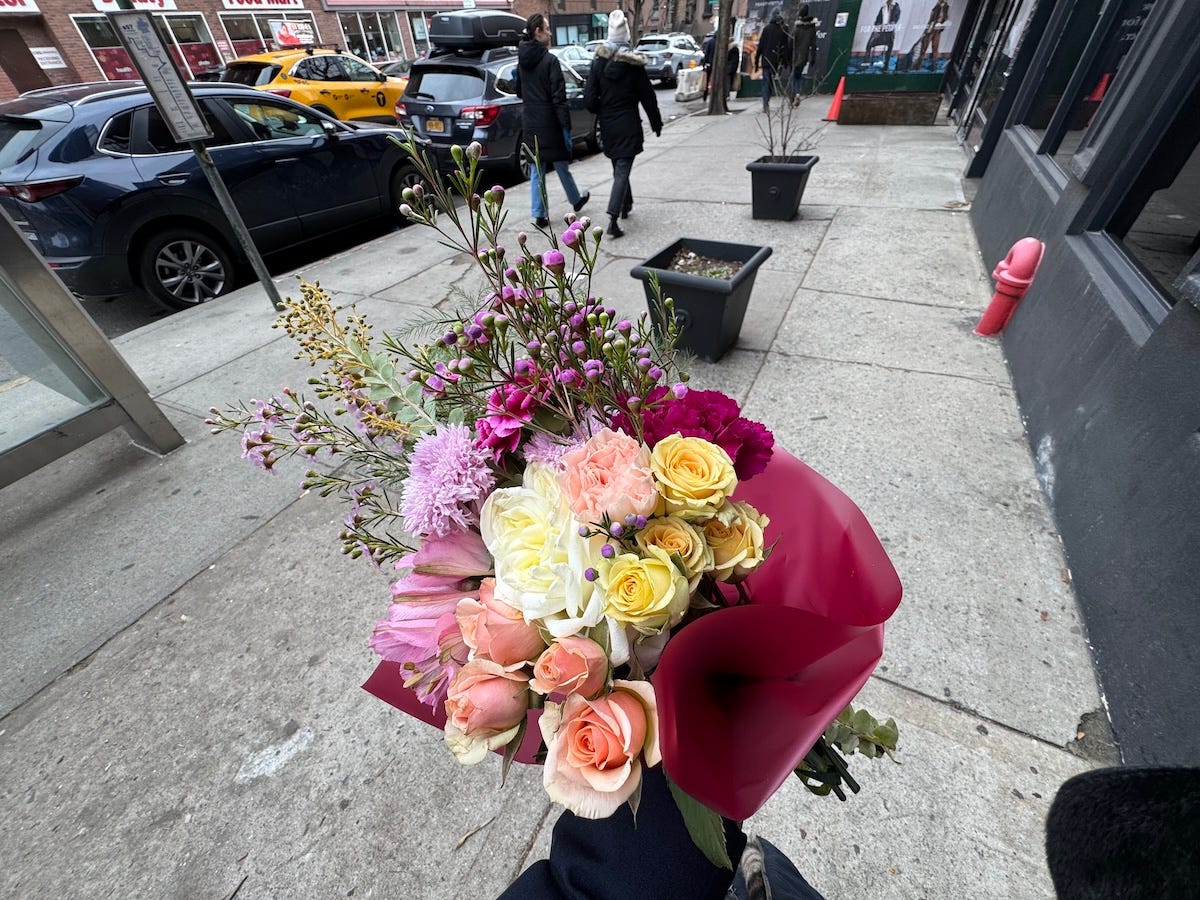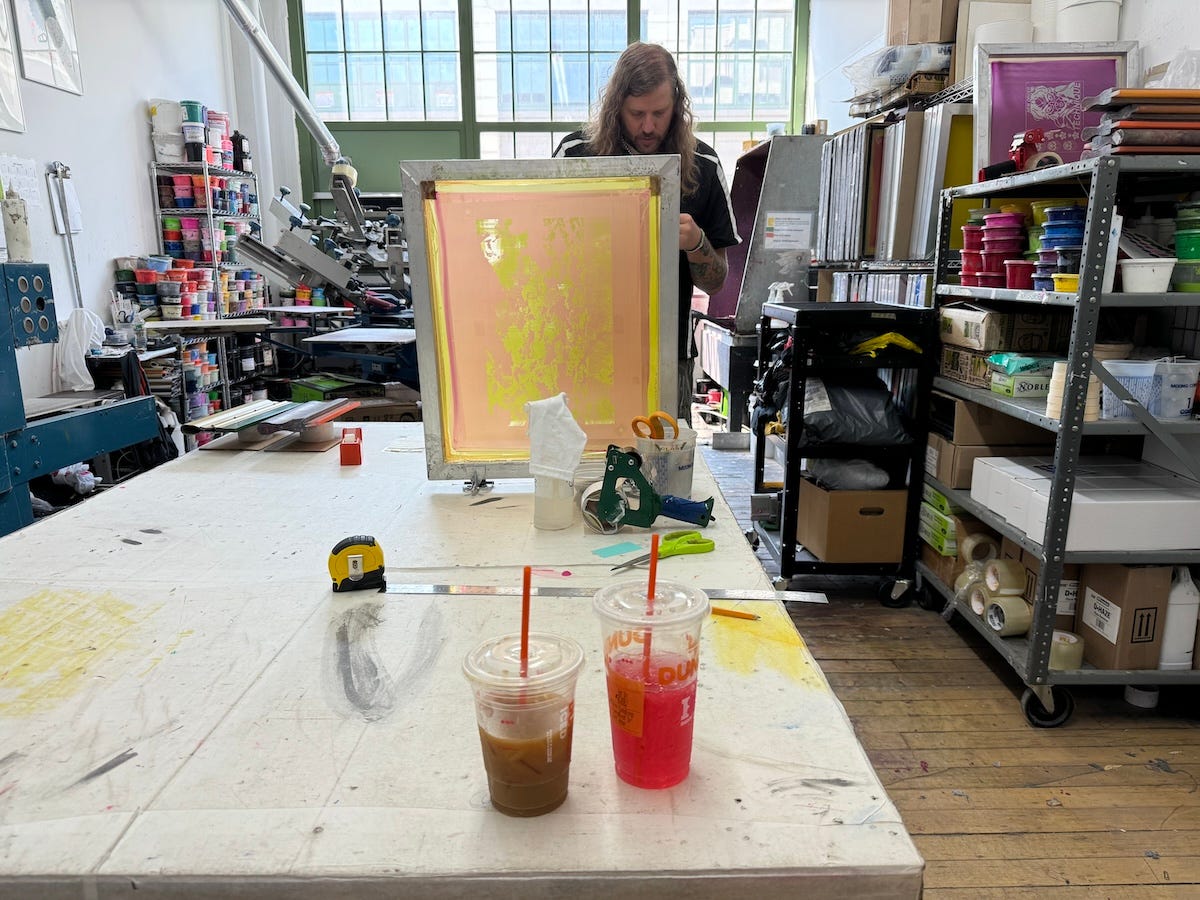Last night as I was going to sleep I jotted a line in my reminders app — my head is an anvil between two loaves of wonder bread — but I think I meant to say my heart is a phone call called v2_v3-final_FINAL exported to the Blockbuster in heaven where everything beautiful returns after your rental period is up.
An excerpt from Kahlil Gibran’s “On Friendship” from The Prophet (Knopf, 1923):
And let your best be for your friend.
If he must know the ebb of your tide, let him know its flood also.
For what is your friend that you should seek him with hours to kill?
Seek him always with hours to live.
For it is his to fill your need but not your emptiness.
And in the sweetness of friendship let there be laughter, and sharing of pleasures.
For in the dew of little things the heart finds its morning and is refreshed.
Thankful for friends who are everything beautiful. And thus continues my 2024 Field Notes…
The Art of Going Off-Script
In conversation with Eugene Kan and Charis Poon, HK-based friends who share the space-time continuum that is "artists who work." The chat started with making art vs making strategy, approaches to getting to desired outcomes, and then...
Charis: Experimentation is an outcome too, in my mind, did I succeed in being experimental?
Eugene: I like this.
Vicky: Question for the class - tell us about a time you were experimental?
Charis: The realm in my life I’ve been experimenting a lot to some success and failure is the design of the courses I teach. (Editor's note: Charis teaches Social Design at the PolyU School of Design in Hong Kong.)
My first year of teaching, I hadn’t fully realised how teaching is an intense creative exercise. Where I’ve been flexing my experimentative muscles is in how the course is structured—what is the schedule, what is taught each week, how is material delivered, what kinds of critique activities would be impactful, how can I provide for different learning needs.
I ask myself a lot how teaching and learning can happen differently than the mainstream narrative we’re told to expect in classrooms.
Should the teacher speak the most? Should students do homework? I’m not saying that my answers are always radically different, but I like to keep changing the model and seeing what works or doesn’t work.
Vicky: Omg! That reminds me of something you said our last piece on online communities -
“Charis: I have to share this book with you two, it's called Deschooling Society by Ivan Illich published in 1971. Essentially he says that we don't need schools and we could each of us be teacher and learner. And some of what he says did come true, with the Internet and Discord channels and Patreon, Substack, etc.
And actually to what Eugene said about being attracted to "here's what I'm expressing" is what he puts forward as a possible model for how people can come together — that people will come together based off of a common media artifact or a common desire of expressing yourself around something.
We talked about this a LOT with [our publication] MAEKAN and never really wound up somewhere actionable. How can MAEKAN not revolve around me and Eugene and Alex Maeland, but be about equal participation, as much participation and action that any one participant wants?”
Charis: lmao, we are self-referential Vicky: Good gives me a push to backlink lol Charis: (non-derogatory) Vicky: (I cannot for the life of me optimize my own content) Charis: we have continuity!
Eugene: I think it all comes down to incentive alignment, as much as I hate using that word. Like if you want to create this platform where others participate, you have to find people that want to be part of that.
There’s a high barrier to entry to get people to create and there has to be a clear upside to it:
Prestige (association with a movement)
Distribution (lots of people seeing it)
Creative intentions (desire to create)
Remuneration (or not lol)
Luxury of time (free time to create if 4 isn’t on the table)
Eugene: Like MAEKAN never really worked out cause you didn’t have this highly specific 5-circle Venn diagram that was firing on all cylinders.
Charis: Ugh, lists make me think of AI generated content so much now Vicky: not the lists of bulleted lightbulbs on LI posts! Charis: Sorry, unrelated comment
Vicky: On the barriers to entry — reminds me of this piece from writer Paul Ford where a 2000 and 2020 speaker talk about how tech's progressed:
"’00: There also must be some really good music discussion forums.
’20: Independent forums are mostly dead, swallowed up by Reddit, social media, and the like. I cannot overemphasize how much the lesson of the web is that people, given the choice between the freedom of operating and managing their own platform, and running a centralized platform that they do not control, will choose the centralized platform. The desire of regular people, people with things to do, to also become systems administrators is far less than what we assumed it would be.
Personally, I think it’s relaxing to write this, even though 150 people will read it at most, because it lets me resolve internal tensions and organize my thoughts. The reward for doing good work is more work. But most human beings find labor…laborious. Most people don’t have obsessions with boring, abstract things. They don’t get the chance. And they don’t have lots of time they can use to write “for free.” There are many theories about how this all works, including, say, Marxism."
Charis: I’m also reminded of desire, in this conversation. A lot of my students I find don’t know what they really want, they don’t have an intuitive sense of what they desire, and I find this to be something they need to develop.
For a younger creative person, if you’re not clear on your own desires, you allow yourself to take on other people’s or other structures' desires.
Of course, we all know in business and corporate situations we have to play within limitations and restraints, but I think actually you have to first develop a fine-tuned recognition of exactly how what you desire is being limited.
And then look to set up for yourself situations in which you can satisfy those desires (and I don’t mean desire like “I want to get rich”).
Vicky: I think what you say about not knowing your own desire is true for those who are decades into their career too.
Looking back at how I’ve toggled between conventional FT work and independent work - I can see how each switching point was due to understanding myself more clearly. Having sharpened principles. I can’t always verbalize the intuition but there is an innate annoyingly unstoppable force that’s like, it’s time for the next.
Eugene: Yeah without doing the hard internalized work of asking yourself honest questions (or the luck of just stumbling upon a passion), most people lack direction.
Charis: Wait, can you two go back and answer the question about what you two have experimented with lately and felt succeeded?
Vicky: Definitely in making my first zines. I befriended one of the guys who runs my local record-shop-that-sells-coffee and found out he’s a screenprinter. Took his intro class which forced me to come with print ideas on a weekly basis. Then a year later it turned into the perfect storm of Good Arson.
Truly had no idea how involved the process would be, I couldn’t plan much beyond going step by step.
Charis: We talked about this in person when you were in HK and I’m still excited for you that you had this creative experience.
Do you think you can link this specific zine experiment, Good Arson, to thinking about outcomes? Do you remember what intentions or outcomes you had in mind when you started?
Vicky: Honestly I wasn’t thinking about outcomes, it was just an exercise in expression. It was for me.
Charis: Just to be annoying, can I reframe that statement to say “self-expression for yourself” is an outcome 😛
Vicky: hahahaha yes to your desire
But I could probably tie it a bit to the strategic part of our earlier conversation - I think with making art, the helpful part is how it validates what’s true regardless of technology. For example, my personal work is very manually made because I'm a psycho, but even at a small scale it’s proven if you have a brand and a community - aka if you have a self and friends - it's enough. You can distribute your stock and have your beloveds physically holding your words.
Of course there is planning, like how much do you produce in the first place? How do you fit process into the margins of life? You’re still having to define pricing, willingness to pay, what is the value of this to someone? (Not to make money, more so to cover costs.) I’m not calculating when I’m making art, but these things do run through my mind as a natural consequence of creating a thing.
Eugene: On the experimenting question - I generally try to minimize big drastic movements unless there a big variable change.
It could be as simple as, how am I recording information for a project and am I doing it in a way where everybody has access? (Editor's note: Eugene founded Adam Studios.)
Maybe don’t do it on Notes and use a widely accessible option that’s built into say our project management app. That’s the most boringest shit ever but that arguably represents how small and seemingly meaningless these changes can be.
Charis: I don't find that boring! I think thinking about documentation and accessibility and collaboration (all important values) includes actualizing it in everyday small things.
Not everything is razzle dazzle.
Eugene: I like doing mundane things as quickly as possible to free up time for more important/challenging/fun things.
Vicky: Wow that’s like the fight song for AI
Eugene: Yeah but I’ve been on this tip for a minute
Vicky: you heard it here eugene was here before the machines!!!
...from the cutting room floor... Charis: Can I get an example of experimentation, Eugene Charis: are we talking small like I’ll put Yakult in my coffee today Charis: (I didn’t have milk in the fridge one day and used Yakult for my cereal and…don’t try this) Vicky: an inspiration to us all








